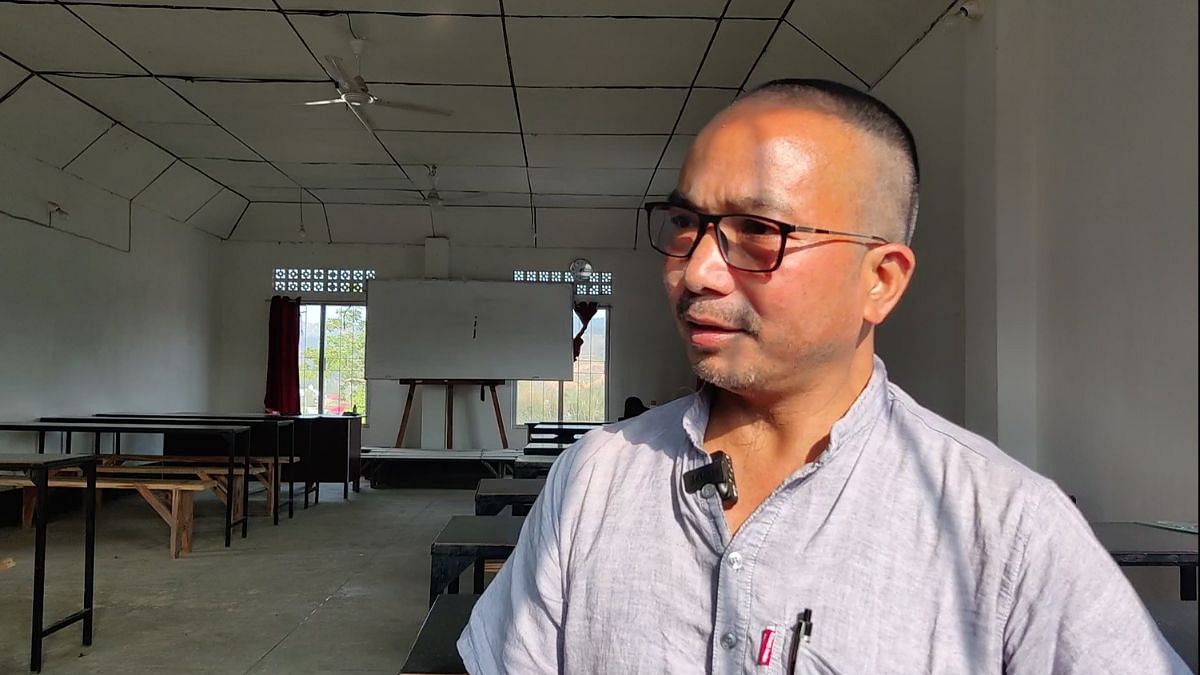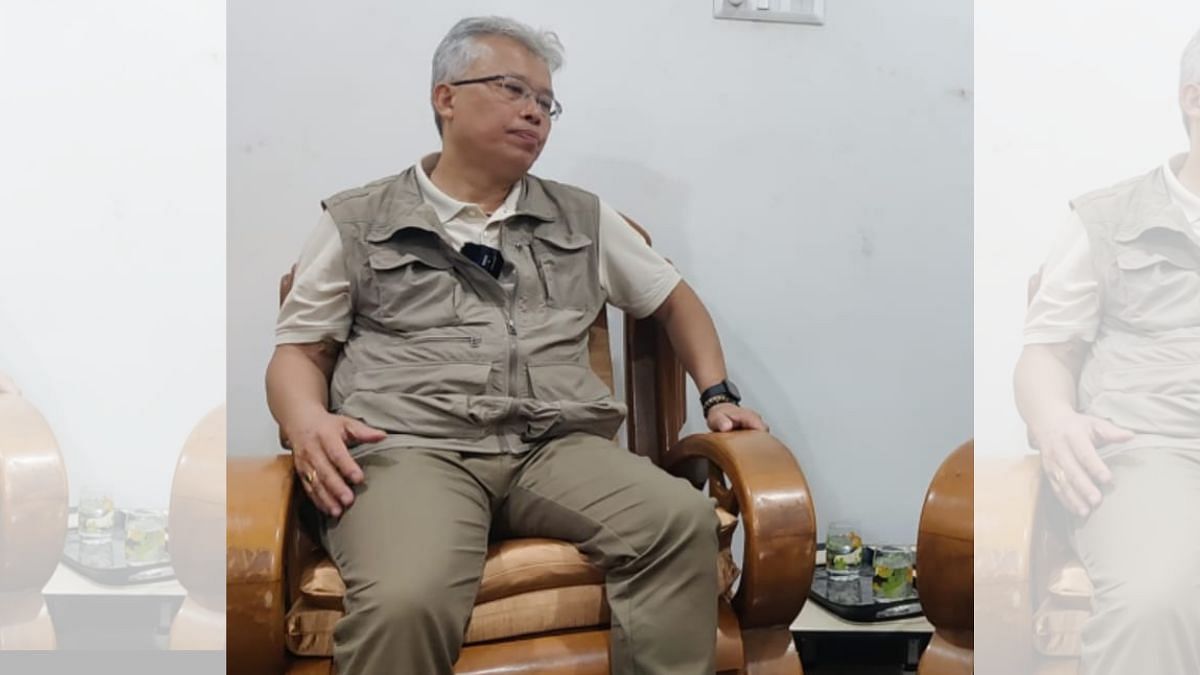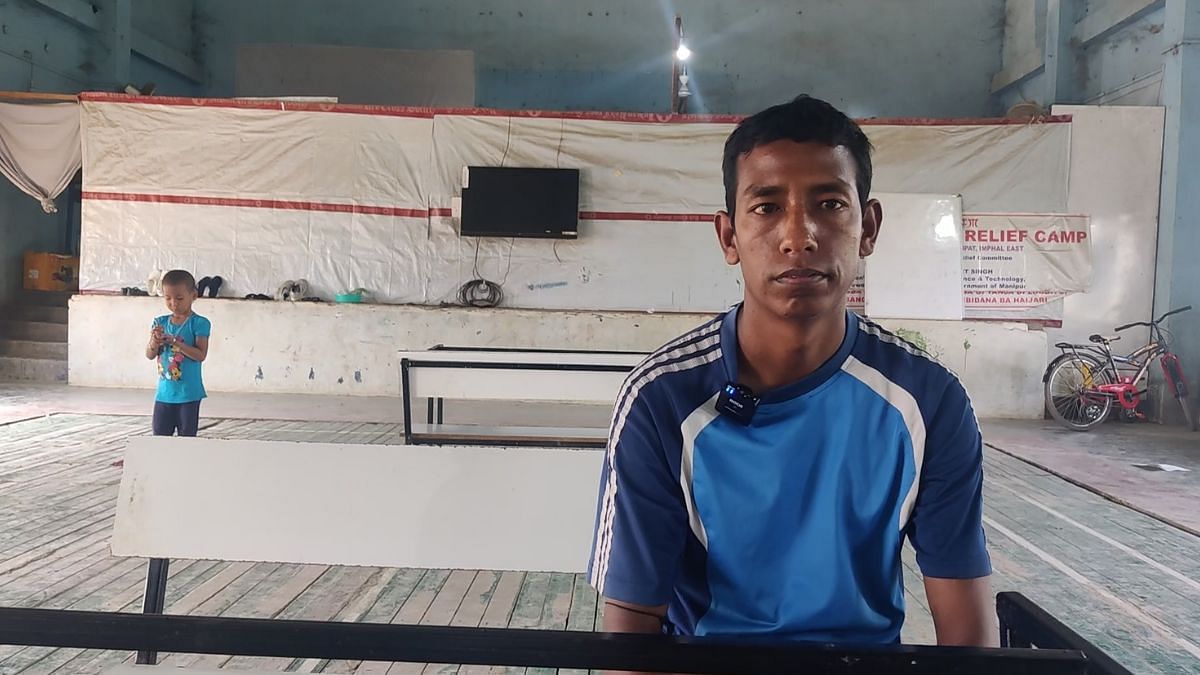Imphal/Churachandpur: In Imphal’s Keishamthong locality, a creaky old printing press next door to Congress Inner Manipur constituency candidate Bimol Akoijam’s residence is churning out pamphlets with his message that every vote for him will take Manipur closer to a “new political culture”.
A group of young volunteers, who call the Congress candidate “Oja Bimol” out of respect, are tasked with distributing them. “We don’t know how far we can circulate them,” said one young volunteer.
They were alluding to a circular that the Meitei revivalist group Arambai Tenggol issued on 30 March. In that circular, the powerful Meitei group “requested” that there should be no public meetings, or use of loudspeakers, party flags, or community meals, robbing the election of its colour.
At Churachandpur Police Station some 60 km away, a question on election campaigning is met with a few chuckles. After the laughter settles, one policeman says: “See, it’s very simple. No candidate, no campaign”.
He’s referring to the absence of any Kuki candidate in the Outer Manipur seat — the only constituency in India where voting will be held in two phases, in line with directions issued by the Indigenous Tribal Leaders’ Forum (ITLF), an influential civil society group representing the Kuki-Zo people.
It has nearly been a year since ethnic violence broke out between the hill-majority Kukis and the valley-majority Meiteis. It has not only killed over 200 people and displaced 50,000 but also sharply divided Manipur along ethnic lines.
Despite these deep chasms, the build-up to the elections has seen the pressure groups on both sides acting in a near-identical fashion on one account — discouraging campaigning by candidates and parties.
The tone and tenor of their statements, too, are similar. In its circular, the Arambai Tenggol said that electoral activities of parties will lead to “further divisions in the society” as people have different political choices.
“People should silently cast their vote for the appropriate candidates,” it said.
The ITLF’s statement on 25 March said that its presidential council, in consultation with constituent member tribes, had agreed that no member of the Kuki-Zo tribes should file their nomination for the election “considering the plight that we are facing”.
“As Indian citizens, we advise our community members to exercise their right to franchise by voting but abstain from contesting from the Outer Manipur seat,” the statement said.
In the plains, several groups of Meira Paibis — influential collectives of Meitei women — have called for a boycott of the polls in the Imphal valley. In the hills, it’s just ITLF, but forums such as the Kuki Inpi have also issued similar calls, urging members of the community to not contest.
According to Akoijam, an associate professor of Jawaharlal Nehru University’s School of Social Sciences, the emergence of groups such as Arambai Tenggol and ITLF is an outcome of the erosion of state authority.
“In the Weberian sense, the state’s monopoly on the legitimate use of physical force must be exercised. You can’t privatise violence, but this has been allowed for 11 months,” he told ThePrint.
On the other hand, practical considerations also appear to have informed the decision of bodies such as ITLF and Kuki Inpi to ensure that no candidates from the community contest the polls from the outer reserved seat.

Speaking to ThePrint at the office of the United Zou Organisation, ITLF secretary Muan Tombing, against whom the Manipur Police lodged an FIR in November 2023 for threatening to set up a “self-governed administration” in the hill districts, said the Kukis opted out from the race as “there is no chance of them winning the seat as Nagas and Meiteis are on the same page and their votes will consolidate”.
Also Read: Congress won’t oppose NRC in Manipur if decoupled from CAA, says party’s LS candidate Bimol Akoijam
‘Politically calculated’
But as election dates near, there are signs of a shift. The BJP is making its presence felt not just in Imphal city, where the party’s banners occupy large billboards, but in many areas in its outskirts that come under the Inner Manipur constituency as well.
Likewise, Congress’s Bimol Akoijam has started pounding the pavement. On Monday, he visited temples and markets in Thoubal, some 30 km away from Imphal city, amid Congress workers raising slogans in his support.

This is because, like all candidates contesting the election in Manipur, Akoijam has been given round-the-clock security. On 30 March, the Manipur Congress had written to the state’s Chief Electoral Officer and the Director General of Police highlighting threats to Akoijam’s life after some unidentified men came knocking on his door on 28 March.
Now, security personnel are posted outside the house he shares with his two brothers and their families, and trail his car wherever he goes.
Meanwhile, Thounaojam Basanta Kumar Singh, the state’s current education and law minister and BJP candidate for the seat, lives in a high-security zone next to Chief Minister N. Biren Singh’s residence.
Apart from meetings in community halls, where people from a cluster of neighbourhoods assemble, the BJP has also been using its spacious office premises that fall on the road leading to the Imphal airport. CM Biren Singh has addressed multiple gatherings of youth and women’s bodies in the party headquarters over the last few days.
A section of Meiteis and Kukis feel that the calls for a poll boycott or diktats to not contest are not entirely emotionally driven, but are politically calculated moves. Many feel that Meira Paibis, through their call for a poll boycott, are essentially paving the way for a BJP victory in the Inner Manipur seat.
“They say they are angry with Biren Singh. At the same time, they want people to boycott the elections. Why not leave it to the people to make their choice or call for a change?” a senior Congress leader said, adding that these were the same people who were key to making the CM withdraw his resignation last year.
On Tuesday, Congress’s candidate from Outer Manipur Constituency Alfred Kanngam Arthur visited Churachandpur — the first campaigning event carried out in the district this election.
Voters divided
There are as many as eight assembly segments of the valley that are home to a large number of Meiteis. They make up nearly one-third of the total electorate of the Inner Manipur seat. On top of that, many voters have found themselves displaced due to the conflict.
While the Election Commission has said that 94 polling stations are being set up near the relief camps to allow the displaced persons to vote, not many who have been living as “refugees in our own land” are enthused about exercising their franchise without any resolution in sight.
Oinam Santosh, a 31-year-old Meitei resident of Moreh who is among those driven out from the hills in the violence, says it makes no sense for them to cast their votes for candidates who will represent areas “where we can no longer step foot in”.
“Still, had there been measures to send us back to our villages, we could have explored the idea of voting. Now I am not sure, even though I have the option of voting near the relief camp,” he said.
However, even among the internally displaced people, the elderly, who have been voting diligently over the decades, say 2024 will be no exception.
“Voting is my right. I know there’s nothing left to vote for, but I will still vote. The government did not burn our houses, or drive us out from our land. I hope my vote strengthens the hands of whoever comes to power. Not voting is also an option, but it’s for individuals to make their choices,” said Babu, 81, who has spent the past year in a relief camp in Wangkhei in the Imphal east district.
(Edited by Uttara Ramaswamy)
Also Read: What happens in closed-door meetings at Manipur CM’s house & how he’s hard at work to show ‘PM cares’

